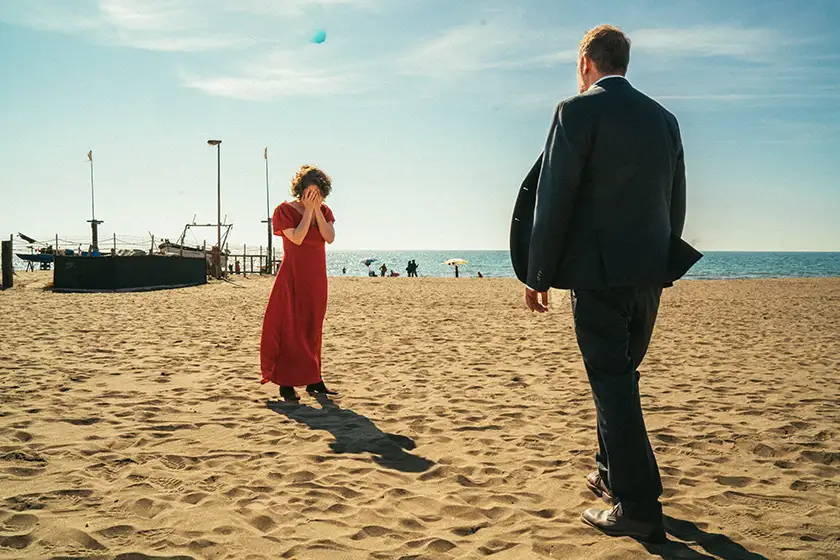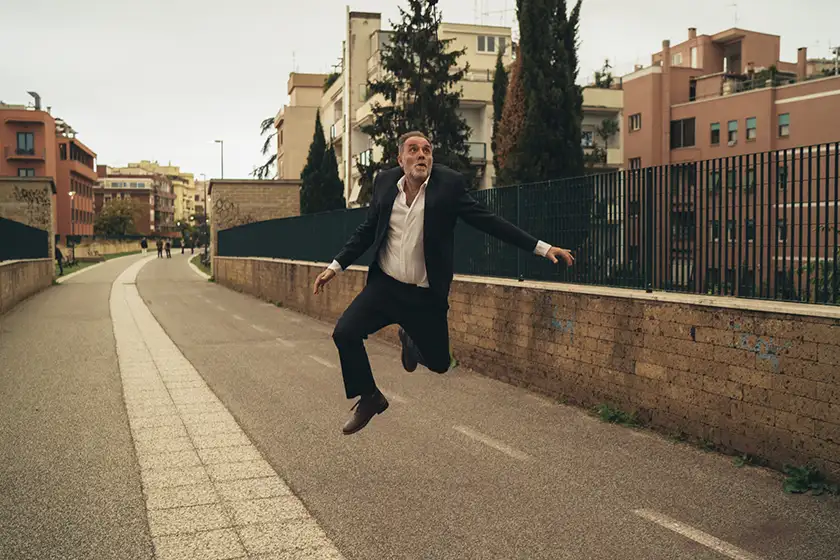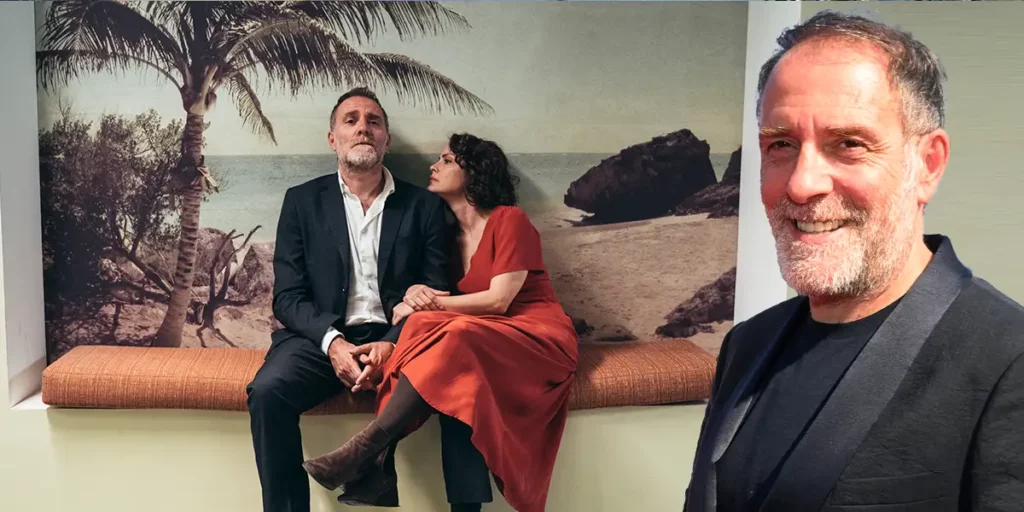We interview writer-director-star Valerio Mastandrea on Nonostante (Feeling Better), the opening film of Orizzonti at the 2024 Venice Film Festival.
Nonostante (Feeling Better), from director, co-writer and star Valerio Mastandrea, was the first film I watched at the 2024 Venice Film Festival, and also the first one to really speak to me. The movie, which opened the Orizzonti strand of the Mostra del Cinema and whose title literally means “in spite of / notwithstanding / despite,” mainly takes place in a hospital, where a series of nameless characters exist in two dimensions. Most of the film’s characters, including the protagonist (Mastandrea) are in a coma, and yet, at the same time, a part of themselves is also able to exist outside of their bodies, walk around, and even leave the hospital.
Not only that, but all of these characters are also able to interact with one another, and a very real sense of community exists between them. Of course, it’s all temporary, as some of them eventually wake up, forgetting what happened when they were asleep, while others pass away; but for the time being, our characters are able to experience most aspects of life in this state of limbo, including the good that it has to offer. At the center of it all is the blossoming romance between the protagonist, “He,” and a new patient, “She” (Dolores Fonzi) who disrupt his routine and eventually makes him realize that life is worth living. But there are so many more themes in a film that tackles anything from love to grief to the nature of memory, and everyone is bound to get a different message from it.
In this interview with Valerio Mastandrea, we talk about what Nonostante (Feeling Better) means to him, who his “Nonostantes” are, the writing and filming process, casting Dolores Fonzi, the themes of the movie, and more.
Valerio Mastandrea on the Venice Premiere of Nonostante (Feeling Better) and What the Film Means to Him
Thank you so much for this incredible film! I watched it before the festival, on my computer, and I can’t wait to see it again on the big screen because it really spoke to me on so many levels.
Valerio Mastandrea: I actually watched it for the first time last night! The editing process took so long that I was nauseous: I didn’t even want to see it at first. I had seen a test screening in a room, but then I watched it with an audience [at the Venice Film Festival World Premiere, on August 28, 2024] and it was… It still surprises me to see something that you’ve worked on for three years become so big, shared by so many people. It was beautiful.
The line that really got to me in the film is when someone tells the protagonist, “You’re not nervous; you’re just very sad.” It really made me think about his past, and how we don’t really know anything about him. To me, it feels like he’s grieving the loss of his father when we first meet him. I saw that Nonostante is dedicated to your own father. Is there an autobiographical element for you in it? Where did the idea come from?
V.M.: The film is dedicated to my father because, in the original idea we [Valerio Mastandrea and co-writer Enrico Audenino] had for the film, the “Nonostantes” are a category of people. They are those people who approach emotions, bonds and relationships in a specific way, with the tendency to either let these emotions crush them or deny them altogether, out of fear. They are people who face the agony of life, which can also be a wonderful agony, because when the Nonostantes fall in love and recognize each other, I think they can really experience love in an incredible, emotional way. I think my father was one of them, so that’s why I dedicated the film to him.

Is that where the idea of the film came from?
V.M.: It is. We wanted to tell something powerful and moving, which is about how difficult it is to abandon ourselves to love – because love messes up our plans, from the moment we first experience it. That saying that goes, “I met the right person at the right moment”: it’s not true. There never is a right moment, because love turns your life upside down and revolutionizes your plans completely, you know? So [in order to experience it] you need to have the courage to accept it, or to be willing to see where it leads you… We often don’t have that courage, and this makes us miss out on so much.
That’s what we wanted to try and tell. And then, so many things came later, as we started to work on it. The idea to put our characters in a state of stillness, for example: that was to say that love wakes you up. And then, like you were saying, we don’t know anything about these characters. That was our biggest bet: not knowing what their stories were, and not even knowing what their names are. Because what mattered to us was the moment: the here and now.
And there are so many characters too! You have one character – the teenage patient in the hospital – who only has a couple of scenes. I think he calls himself a “lost cause” at some point, and that’s it.
V.M.: True. We mainly wanted to focus on what these character stand for, on a symbolic level. In his case, it’s that you can be stuck even when you’re sixteen years old, because adolescence scares you so much to paralize you. So we added a very young patient, and then there’s also a woman who’s been there for a very long time [Laura Morante’s “Veterana”] and who can’t stand it anymore. This film is a big game, in the end.
The Premise of Nonostante (Feeling Better) and the Challenges of Writing It
Something I really loved about Nonostante is that it’s so easy to understand its premise, no matter how unusual that situation might be. The characters are in a coma but they are also alive, and we are ready to accept that right away.
Valerio Mastandrea: That was the big fear [writing-wise]: setting up the film in a way that would make people accept that kind of “pact” right away, because if you’re not ready to accept it, then you’ll give up on it right away. Some people did give up on it [at the screening], for example, and it’s normal. Our greatest bet was trying not to be didactic, but to lead people into that world a little at a time, in those first ten minutes. They would get used to inhabit it, and to understand how we’d be telling that story – in a way that perhaps only a medium like cinema would allow. I’m happy that it was easy to understand for you.
Without spoiling the film for our readers, did you always know that this was the way you wanted it to end?
V.M.: I did. There are many endings to this film, but, to me… What I always hoped would happen, whenever I was in an unrequited love situation with someone, was that that someone would one day find out how much I loved them, and be haunted by it, you know? Not in a curse sort of way [laughs], but in a way to let that someone know how something that they perhaps didn’t feel felt to me. I wanted to end the film in the present: it’s a real dimension in a movie that doesn’t have many of those.
You were saying that the writing process was very long. Why is that?
V.M.: This wasn’t an easy film to make. We [Valerio Mastandrea and co-writer Enrico Audenino] started writing it right before the pandemic, and then, with COVID going on, we sort of both stopped without even telling each other. We just stopped talking to one another. One day we were writing and telling each other, “Let’s talk again next week,” and then we didn’t speak again for two months. There was a text message here and there, just to check in with each other, as if to say, “Ok, let’s take a break.” Then we started writing again, very intensely; it took two years to write it, one year to prepare it [production-wise], and then we filmed it. It took a total of three and a half years to make it, in the end.
Valerio Mastandrea on Working with Dolores Fonzi and the Music of Nonostante (Feeling Better)
How did you cast your co-star, Dolores Fonzi?
Valerio Mastandrea: I really wanted to work with her after seeing her in a film at a festival where I was in the Jury. She really made an impression on me: she has such power when she acts. It feels like there’s an incredible story behind her eyes; she’s such a good actress. I found her and sent her the script, she loved it, and we met in Venice last year. We started shooting one month later; it was a wonderful experience.
I loved the music in the film, both in terms of the actual tracks you used and the score.
V.M.: This is my second film [as a director], and I always find it incredibly difficult to score movies. Music is everything in life, and scoring a film is taking on such a huge responsibility, because it has the power to destroy a scene. You could use a track you love and end up ruining that scene for it, so you need to find one that you might like less, but that works. This was a difficult film to score, and producer Valeria Golino suggested we hire an Islandic musician named Tóti Guðnason. She had worked with him on her mini-series L’Arte della Gioia [2024]; I think he was the right choice for us, as distance really helped us [collaborate in a way that would work for the film]. He’d send us his work, interpreting the scenes [by scoring them], I’d clean it up, and we’d work like that.
Valerio Mastandrea on The Ending of Nonostante (Feeling Better) and Themes of Life & Death in the Film
I’m so interested in the character of “Volontario” [Giorgio Montanini], someone [whose role is best left unspoiled] who seems to have a foot in both worlds. Some might even interpret him as a sort of a God figure?
Valerio Mastandrea: The actor who plays him would be happy to hear that! [laughs] I guess he would be a sort of pagan God: someone who feels the agony of living in both sides. To me, he’s a revolutionary character, someone who suffers twice as much as everyone else. He’s also very torn, when he’s asked to do something that goes against the rules.
Spoiler warning about the ending of the film for the next three questions!
There’s a point where he’s asked to convey a message and he says, “That’s not how it works.” That’s what made me think that he knew something we didn’t. That sentence really made me think.
V.M.: “That’s not how it works,” meaning, there are rules in life, and [the fact that he cannot convey a message on behalf of the protagonist to someone else who has woken up from the coma and forgotten about him] is one of them. But in the end, he decides to do it, because he feels that it’s important, and that he has to do it.
Your characters often come across very strong drafts of wind in the film, and struggle not to be taken away by them. There’s a point where we find out where they come from: it’s when someone dies and tries to take others with them, because “no one wants to be alone when they go.”
V.M.: This is a film which celebrates life, and whenever you deal with this kind of theme, you cannot avoid dealing with death too. It’s all around us, and we live knowing that eventually we’re going to go. Hence the idea of entrusting the great mystery of death to the wind. It’s like that saying goes, va dove ti porta il vento [go where the wind takes you]: here, we get to find out where the wind takes you. It takes you to a boat where everyone’s resigned, knowing they’re going to die, and he’s not ready to give up.
You know, this is so interesting to me. I feel that the scene of the boat at the end could be up to interpretation. Some could even interpret it as the protagonist having that sort of reaction because he’s tired to be in that state of limbo and finally ready to accept death.
V.M.: To us, that scene meant that he wanted to live, but we did cut the scene where he actually says it out loud, so as to not give it away too easily, and be a little “rebellious”. But I like that there are different interpretations! I like it a lot!
No more spoilers from here on!
Going back to the drafts of wind, there’s a scene where you fly. Was it difficult to shoot?
V.M.: It was tiring, yes. Tiring and frightening, because they hang me up like a salami and made me twirl around… It was an experience to not do again! [laughs] But the team, called Ea Stunt, was extraordinary: they are so good and so careful. They did an amazing job here! They’re the ones who deserve all the credit here.

That scene is so good! As I was watching not just it, but also the entire movie, I kept thinking that it must have been difficult to star in a film that you also directed and co-wrote, in a role that has you in every single scene of it, including some very intense ones.
V.M.: It was difficult, but it also sort of irritated me! In the editing stages, I was so sick seeing myself all the time.
Do you think you’d like to continue directing films in which you also star?
V.M.: I hope so! I’ve only just started [directing films in which he also plays the protagonist], but I like doing it, and there’s always a new story to tell.
Thank you so much for speaking with us!
This interview was conducted in Italian, translated into English, and edited for length and clarity.
Feeling Better (Nonostante), the opening film of Orizzonti, had its World Premiere at the Venice Film Festival on August 28, 2024. The film will be released soon in Italian cinemas.
Header credits: A still from Nonostante (Feeling Better) / Director Valerio Mastandrea on the red carpet for the film at the 2024 Venice Film Festival (Matteo Graia / Giorgio Zucchiatti, La Biennale di Venezia – ASAC)

